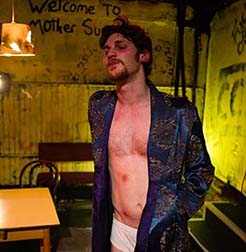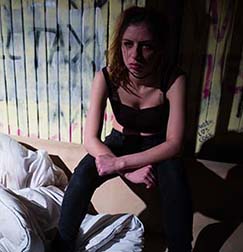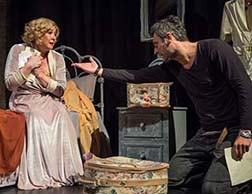
Lucy
Komisar
|
Edinburgh Fringe 2016: the people the
system chews up “Diary of a Madman” A subtle, powerful critique of the corporate system that chews up and spits out workers is “Diary of a Madman,” which won the 2016 Stage Edinburgh Award. It is inspired by a story by Gogol about the decent into madness of a low-ranking civil servant who is criticized for not having achieved. Part of his insanity is his belief that he understands a conversation between two dogs.
Here the anti-hero is Pop Sheeran (the very fine Liam Brennan), a bridge painter whose livelihood is threatened by the invention of a paint that will last for decades, ending his job of repainting the bridge every year. It is of course a metaphor for the threat that automation poses to working people. Pop, in his 40s, is on a ladder with a paint pail. He paints every day as his father did before him. He gets light-headed from the fumes. He is proud of his brushes, made of weasels’ hairs. He shows them to Mathew White (Guy Clark), 22, who has come from university to intern for the summer. Pop doesn’t know Clark is part of the new paint regime. Pop seems always perturbed, dissatisfied, left behind by modern times. His great love is for the film “Braveheart,” about a Scottish warrior hero. He takes medication for depression. His sensible wife Mavra ( Deborah Arnott) is caring and despairing. Daughter Sophie (Louise McMenemy) and her friend Melanie (Lois Chimimba), 17, both terrific in their roles, are consumed with rock music and have little respect for Pop.
Neither does the system. Mathew’s father got a knighthood for creating and selling an algorithm for painting. And by chance the gregarious Sophie met him at a bar before realizing he would be working for her father. Clark’s master’s thesis is to test a new paint that could last 50, maybe 75 years. You feel the tragedy coming on. Pop wonders, “If it lasts that long, what am I going to do?” More threatening, the bridge has been bought by Qatar. Pop insists, “This bridge is not for sale.” He must defend it. They’d have to sandblast off the layers of old paint Pop and his father have applied. He insists, “You scrape off the paint, you scrape off the history.” He becomes Braveheart, with a kilt and a knife, his face twisted in pain. Gogol’s fantasy of dogs becomes a fantasy of talking to Melanie’s toy rabbit. The acting is superb, riveting. The platform set becomes red as if marked by spilled red paint. Or heart’s blood. Traverse Theatre http://www.traverse.co.uk/ “Trainspotting”
“Trainspotting” is an Edinburgh Fringe standard, performed in a small box theater where patrons sit on benches and hope they won’t get doused with dirty water and worse. It’s about the detritus of society, the drug addicts and drunks who can’t get or hold jobs and don’t really want to. Outside the small theater, walls are marked by f__k and other obscenities. At the entrance, the 100 or so audience members get red, green, purple, or blue lit bracelets, and then they are led into the dark or dimness by actors. In the center, people dancing to rock music hold colored lights. Srobe lights flicker. The audience sits on low platform risers. The actors pull some of them up to dance. Sometimes it is hard to understand the accents, Scottish or Cockney, but the actions tell all. A guy on a couch near the door is naked. He is covered in excrement. He gets up and throws a dirty blanket on patrons. Then he throws a bag of the stuff on a table where some of the play’s characters sit. There is simulated sex. The shock tells us we are in the midst of low life, a society where men are violent against women and to each other.
For red-bearded Tommy (Greg Esplin), the ultimate challenge is how they deal with work. He is looking for a job. He doesn’t really want a job, but he needs to do this to get welfare. In the small room, the audience is closer to the action that some might want to be. We are seated next to a dirty toilet. Mark (Gavin Ross) leans over it, bare-assed, and reaches in his hands to throw dirty water onto people next to us. He climbs over audience members and flips a dirty condom that lands among them. He rails against the misery of the world. Alison’s lover kills their baby. You are in their lives, which is shoddy, gross, crude, blown apart by heroin. It’s a long, unforgettable, sometimes appalling, always riveting one hour. In Your Face and King’s Head Theatre “A Streetcar Named Desire” Curious that a Georgian company would put on the Tennessee Williams play about a Southern woman made dysfunctional by the society she didn’t fit into. But Keti Dolidze’s strong contemporary interpretation gives us a chance to compare the “failures” of that genteel American South of the 1940s with what happened in later years.
The Tumanishvili Film Actors Theatre of Tbilisi, which presented a stunning version of “Animal Farm” at Edinburgh in 2014, has now turned to naturalism with a jazzy melodrama that provides a gothic vision of the South. It’s in Georgian with English supertitles. But what the company does to Williams’ play is make it not seem like the American South at all. It could be located anyplace with tough working class people who take women for granted. Blanche DuBois (the very good Nineli Chankvetadze) is a tough matronly blonde who is anything but fragile. She is not a floozy, but she drinks. In a saffron colored dress and pearls or all in white, which represents the woman she would like to be, she is never delicate. Mitch (Temo Gvalia), the guy she wants, broods and drinks a lot. He has another girlfriend, but wants Blanche and feels betrayed by learning about the ex-school teacher’s sexual history. The men, including the Polish Stanley (Imeda Arabuli), drink and play cards a lot. His wife Stella (Irina Giunashvili) seems without backbone or sense of self. If Blanche is destined to end up in a sanatorium, they drove her there. It could be rewritten as “Diary of a Madwoman.” Not as crude or cruel as “Trainspotting,” but in each case an economic system with few options for them drove them to their own madness. Tumanishvili Film Actors Theatre http://www.tumanishvilitheatre.ge/en/index.html Edinburgh Theatre Arts https://www.edinburghtheatrearts.com/ Edinburgh Festival Fringe http://www.edfringe.com/
|
| museums | NYTW mail | recordings | coupons | publications | classified |





